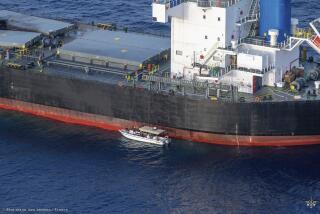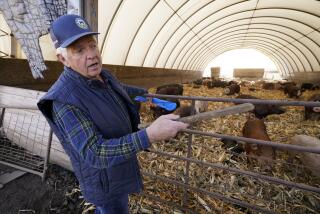A Shipload of Sheep Without a Harbor
- Share via
JAKARTA, Indonesia — For more than seven weeks, a ship full of unwanted sheep has wandered the Red Sea and the Persian Gulf searching for a country that will accept them.
The ship set out from Australia with nearly 58,000 sheep, all of them bred for slaughter during the upcoming Ramadan, Islam’s holiest month. But Saudi Arabia, alleging that too many of the animals had a skin disease, rejected the shipment. Now Australia can’t give the sheep away -- even to war-torn Iraq and Afghanistan.
As the pariah ship has cruised the Middle East, at least 5,200 sheep have died from the 100-degree heat and the stress of confinement. Australia insists that the remaining animals are healthy, but dozens more are dying every day.
Rumors of sick sheep on the ship have spread throughout the Muslim world. The fear of contamination is so great that Jordan wouldn’t let the freighter come into harbor and Egypt refused to let it pass through the Suez Canal. So far, 27 countries have refused to take the animals.
In Australia, animal rights advocates say the conditions of the voyage amount to extreme cruelty to the animals. For a month, some prominent activists have urged the government to kill the sheep at sea.
“Those sheep cannot be allowed to suffer like this, and the only solution is an emergency slaughter,” said Dr. Hugh Wirth, president of the Australian Royal Society for the Prevention of Cruelty to Animals. “If such measures had been taken when recommended, those poor animals would be out of their misery by now -- instead, they are still trapped on that death ship in extreme temperatures, extreme humidity and surrounded by a sea of their own excrement.”
For years, Australia has been raising livestock specifically for the Middle East market, where Islamic tradition and lack of refrigeration dictate that the animals be slaughtered at the time they are consumed. Australia is the world’s biggest exporter of live animals, sending 6 million abroad each year. Long criticized by activists for its treatment of the animals, the $600-million-a-year industry has been plunged into crisis by the latest episode.
Prime Minister John Howard, who stepped in to manage the emergency, said Wednesday that the ship would begin heading back to Australia while officials continued to search for a country that would accept the sheep.
“The preferable outcome is to find another country that will take them, and we are still working on that,” Howard said. “It is just quite impractical and horrendously difficult to slaughter them at sea.”
The 11-deck ship, the MV Cormo Express, was allowed to dock in Kuwait this month to take on food and fuel. When it arrived, the Al Watan daily newspaper ran a banner headline: “The Ship of Death Is in Kuwait.”
The freighter is scheduled to leave this week for the 16-day return voyage to Australia.
The Dutch-owned ship with a largely Philippine crew left Australia for Saudi Arabia on Aug. 5 with 57,937 sheep aboard -- all of them 2-year-old rams. The sheep were destined to have their throats slit in accordance with Islamic tradition and were supposed to look their very best.
In Jidda, Saudi Arabia refused to accept the animals Aug. 22 after a government inspector concluded that too many had “scabby mouth,” a virus that makes sheep less attractive but doesn’t affect the quality of their meat.
Under its agreement with Australia, Saudi Arabia is not required to accept a shipment if more than 5% of the sheep have scabby mouth. Initially, the inspector said 30% of the sheep he sampled had the disease, but the figure was later scaled back to 6%.
An Australian veterinarian who traveled aboard the Cormo disputed the finding, contending that the rate of scabby mouth was 0.35%.
Subsequently, Dr. Ghazi Yehia, an independent veterinarian from the World Animal Health Organization, examined the sheep and declared them healthy. There was no evidence, he said, that there had ever been a significant outbreak of scabby mouth during the voyage.
Some Australians have questioned whether the shipment was turned away because their country had sent troops to help U.S. and British forces invade Iraq. But the Australian government and animal activists reject that theory, suggesting instead that the debacle was the result of a Saudi business deal gone awry.
Officially, the sheep belonged to a major Saudi importer, who took ownership of the animals when they left Australia. According to Wirth, other Saudis wanted to scuttle the deal because they could get a better price from Somalia and Ethiopia.
Whatever the reason, the collapse of the deal has highlighted problems in Australia’s live export industry.
Advocates of the business have said that conditions on the Cormo are better than on the First Fleet that brought convicts from Britain to Australia in 1788. If so, that’s not saying much.
Animal rights groups contend that conditions on the animal transport ships are atrocious and that the trade should be banned. The animals are packed closely together in poorly ventilated pens, they say, and typically spend the voyage covered in their own waste. It is routine for some animals to die from heat or suffocate from crowding, activists say. Conditions are at their worst when the ship is docked for days on end and there is no breeze to cool the pens.
The Australian Royal Society for the Prevention of Cruelty to Animals ran a series of advertisements last month deploring the conditions on the Cormo. “A recipe for cruelty,” the ads said. “Take 57,000 sheep and steam to over 40C (104 degrees Fahrenheit) for 53 days.”
The Australian government, which contends that recent regulations have reduced mortality on the transport ships, hopes to restore the country’s reputation for high-quality livestock by finding a country that will take the sheep for free.
The Australian livestock industry bought the sheep back from the Saudi importer for $2.5 million as the ship began touring the Mideast. At one point, Australia worked out a deal to give the sheep to Afghanistan, but it collapsed when Iran and Pakistan refused to let the animals cross their territory.
In Iraq, plans for British troops to distribute the sheep fell apart when authorities concluded that the occupation force didn’t have the resources to handle the animals, Australian Agriculture Minister Warren Truss told reporters.
Other Arab countries followed Saudi Arabia’s lead and refused the shipment. Italy and other Mediterranean countries were interested, but with the Suez Canal off limits, there was no practical way to get the sheep there.
Indonesia also rejected an offer to take the sheep -- not because of scabby mouth but because of fears the animals might have picked up a contagious disease in Saudi Arabia that could threaten Indonesia’s livestock, an agriculture official said.
Australia’s last hope may lie with Sri Lanka or East Timor, two countries recovering from recent conflicts that might be desperate enough to accept the donation.
If Australia can’t find a place to land the sheep, its options are limited. Australia does not import livestock, officials say, so it isn’t equipped to unload such a large number of sheep and keep them in quarantined isolation if they were returned home.
Slaughtering the animals on the ship would mean stunning each one with a bolt gun, then dropping it down a chute into a macerator that would mince it into fish food. Destroying 50,000 sheep this way could take weeks and could cause an environmental disaster, officials say.
More to Read
Sign up for Essential California
The most important California stories and recommendations in your inbox every morning.
You may occasionally receive promotional content from the Los Angeles Times.










